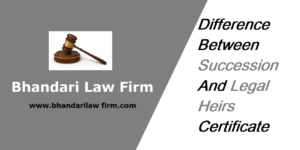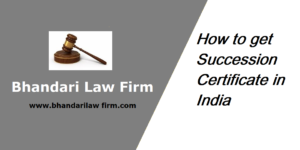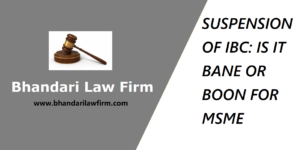Maintenance Under Hindu Law in Various Statutes
Marriage is the very foundation of any society. It is the sine qua non for family peace and stability. In ancient times, marriage was considered to be decided by God, and divinity was associated with it. It is considered to be a sacred social institution. Marriage, according to the Hindu Law, is a holy union for the performance of religious duties. According to the Mahabharata, Wife is not only a source of Dharma, Artha, and the Kama ‟but also a source of Moksha” Maintenance as a concept when considered from the point of view of law refers to the kind of financial assistance given to either of the litigating parties on an application made by them and only through an order passed by the court having jurisdiction to do so and upon execution of the decree in this regard.
The whole concept of maintenance was initiated in order to see that if there is a spouse who is not independent economically than the other spouse should help him/her in order to make the living of the other person possible and independent.
Meaning
The dictionary meaning of the term maintenance is support or sustenance. The term maintenance is not defined in the marriage laws of any of the religious communities. But the entitlement of claiming maintenance is certainly based on the assumption that the claimant doesn’t have the sufficient means to support herself. The maintenance generally covers the expenses for necessaries or essentials for the substance of life. However, it is not merely a right for the survival of the claimant. Before fixing the amount of maintenance the status of the parties and the standard of their life enjoyed by them, during the subsistence of marriage will have to be taken into consideration.
Concept of Maintenance
The right to claim maintenance is a right recognized under different laws in India, each one is different from others in the main and another particular. The child, wife, aged parents, divorced wife, other near relations must obtain some subsistence for themselves. Maintenance in most cases is due to the fact of marriage. Family ties and family obligations of more or less pressing type, call for the need for maintenance. P. Srinivasa Rao Vs. Indira (AIR 2002 AP 130 (FB) Deserted wife would be entitled to maintenance. The provisions of sections 18 and 20 cannot be interpreted in such a manner so as to defeat justice to the deserted wife and her Dependant child. Even otherwise also, food, clothing residence are essential requirements for human survival. Providing such essential requirements to the wife and children being the statutory and moral duty of a husband, the same cannot be denied or postponed.
WIFE DEFINED
“Wife” includes a woman who has been divorced by or has obtained a divorce from, her husband and has not remarried.
“Wife” in Section 125 Carps means a legally wedded wife and also includes a divorced wife, D. Velusamy v. D. Patchaiammal, (2010 SC)
MAINTENANCE TO THE SECOND WIFE
The husband who conceals subsistence of his earlier marriage while marrying the second wife is entitled to give maintenance to the second wife. The second wife is to be treated as a legally wedded wife for the purpose of maintenance, Badshah v. Urmila Badshah Godse, (2014)1SCC188)
Maintenance Under Various Laws
-
Maintenance under Hindu Law.
-
Maintenance under Muslim Law
-
Maintenance under Christian Law.
-
Maintenance under Parsi Law.
-
Maintenance under Codeof Criminal Procedure 1973.
-
Maintenance under Protection of women from Domestic violence Act,2005.
-
The Maintenance and Welfare of Parents and Senior citizens Act,2007
Types Of Maintenance
On consideration of factors by the competent court, maintenance can be granted on the following basis-
- Temporary Maintenance– It is also referred to as maintenance pendente lite which is awarded by the courts during the continuation of proceedings of the divorce. The purpose is to meet the necessary and immediate expenses of the spouse who is a party to the proceedings. On satisfaction, the court may grant it. Section 24 of the Hindu Marriage Act,1955 deals with this kind of maintenance. Further can be claimed under Section 125(1) of
- Permanent Maintenance- As the term suggests, it refers to the granting of a sum on a periodical basis or on a continuous basis once the proceedings have been disposed of. Section 25of Hindu Marriage Act, 1955. Either of a spouse is entitled to receive it.
Maintenance Under Hindu Law
The relief of maintenance is considered an ancillary relief and is available only upon filing for the main relief like divorce, restitution of conjugal rights or judicial separation, etc. Further, under matrimonial laws, if the husband is ready to cohabit with the wife, generally, the claim of the wife is defeated. However, the right of a married woman to reside separately and claim maintenance, even if she is not seeking a divorce or any other major matrimonial relief has been recognized in Hindu law alone.
MAINTENANCE OF WIFE:
Under S.24 of Hindu Marriage Act, 1955 (hereinafter mentioned as HMA Act), either the wife or husband can apply for interim maintenance. The basis of the claim for interim maintenance is that the claimant has no independent income of his/her own to support himself/herself. The provision is silent on the quantum of maintenance and it is upon the discretion of the court to determine the quantum. Similarly, maintenance pendente lite is to be provided to the claimant who does not have an independent income and the financial need for litigation expenses has to be provided by the other spouse.
CALCULATION OF MAINTENANCE UNDER HINDU LAWS
The amount of maintenance to pay depends upon different factors. The courts rely on the provision of Section 23 of the Act while asserting the total maintenance that the husband needs to pay to his wife. The provision lays down the following factors that must be considered to fix a maintenance amount:
- The position and status of the husband and wife,
- Whether the wife has an actual claim for maintenance.
- If the wife is living separately, whether the reason to do so is justified.
- The wife’s total property and income
- The husband’s total property, income generated from this property, and his other income
- . The total number dependents and their expenses are borne by the husband. The personal expenses of the husband.
(Also Read Grounds For Divorce In India)
ROUNDS FOR AWARD OF MAINTENANCE:
Only upon proving that at least one of the grounds mentioned under the Act, exists in the favour of the wife, maintenance is granted. These grounds are as follows: –
- The husband has deserted her or has willfully neglected.
bathe husband has treated her with cruelty
- The husband is suffering from a virulent form of leprosy/venereal diseases or any other infectious disease
- The husband has any other wife living
- The husband keeps the concubine in the same house as the wife resides or he habitually resides with the concubine elsewhere
- The husband has ceased to a Hindu by conversion to any other religion
In the case of K.Sivarama vs K.Bharathithat any marriage in contravention of Section 5 & 11 of the Hindu Marriage Act, cannot be considered to be a valid marriage. Such a woman cannot recourse maintenance U/S. 25 of the Hindu Marriage Act for claiming maintenance.
Maintenance Of Children
Section 20 of the HMA ACT imposes an obligation upon the parents –mother and father, both equally to maintain the children –both legitimate and illegitimate. This is a unique feature of the Hindu law where both the parents are equally responsible to maintain the children. S.20 (2) of HAM ACT lays down that the children are entitled to maintenance during their minority. This right of maintenance for the daughter is extended till she gets married. The parents are obliged to bear her marriage expenses. However even after marriage a minor married daughter, if she is unable to maintain herself then she can claim for maintenance under S.125 Carps. When an application has been filed under section s24 and 25 of HM ACT, the children are also entitled to get maintenance if the claimant has the responsibility of maintaining them i.e. the claimant ‘s right to maintenance also includes the right of maintenance of the children.
Maintenance To Woman In A Live-In Relationship
The Supreme Court expressed its opinion that a broad interpretation of “wife” should include cases where man and woman live together as husband and wife for a reasonably long period of time (live-in relationship/ presumed marriage/ de facto marriage/ cohabitation). Strict proof of marriage should not be a precondition for maintenance under S. 125 Carps so as to fulfill the true spirit and essence of the beneficial provision of maintenance, Chinamaniav. Virendra Kumar Singh Kushwaha,(2011)1SCC141 (This judgment has however been referred to a larger bench)
Recently, it is held that a woman in a live-in relationship has an efficacious remedy to seek maintenance under Protection of Women from Domestic Violence Act, 2005 even if it is assumed that she is not entitled to the same under Section 125 CrPC. In fact, under the Domestic Violence Act, the victim would be entitled to more relief than what is contemplated under Section 125 CrPC, Lalita Toppo v. State of Jharkhand, 2018 SCC ONLINE SC 2301
Maintenance Under Section 125 Cr.P.C
According to this Section magistrate of first-class has the power to order the person to provide a monthly allowance to:
- His parents,
- Wife, or
- To his legitimate or illegitimate minor children who are unable to maintain themselves
- A legitimate or illegitimate major child not being a married daughter, who are unable to maintain themselves due to any physical injury or abnormality
- Married daughter till she attains her majority if her husband is unable to maintain her
- His or her father or mother if they are unable to maintain themselves, whoever neglects or refuses to do so.
Mohd Ahmed Khan V. Shah Bano Begum This has been a landmark case in the history which clearly dealt with the clarifying the scope of Section 125 and which proved to be a milestone specifically in the struggle for the rights of Muslim women.
Supreme court on the following reasons rejected Mohr Ahmed’s plea of not granting alimony:
- The court held that without any discrimination, Section 125(3) applies to Muslim women too.
- The concept of the Muslim husband’s responsibility towards his wife only till the iddat period cannot suffice to contemplate the rule laid down in Section 125 CrPC.
- Merely a triple talaq cannot take away the right of divorced Muslim women from seeking maintenance if she is not in a condition to maintain herself and her children because of no independent source of income.
Conclusion
It is evident from the recent judicial decisions that the Indian courts have been progressively liberal in deciding cases pertaining to maintenance. The bone of contention however is whether a paramour can become entitled to receive maintenance merely from the factum of living with a married man, coupled with the dispute as to whether the bigamy is legally permissible. While it appears from the decisions passed under the personal laws that the same may be possible, judicial decisions pertaining to Section 125 continue to uphold the view that maintenance can be claimed only by a legally wedded wife. Maintenance has been a concern of not only weaker sections but of the society as well. For weaker sections, it is a problem in the sense their very sun/rival rest on the provision made available as maintenance.
Author: This article was written by Ishmeet Kaur, B.A. LLB, student of Government Mohindra College, Patiala.
Note: For any further information or any query you may contact us on 9855677966 or via email info@bhandarilawfirm.com



